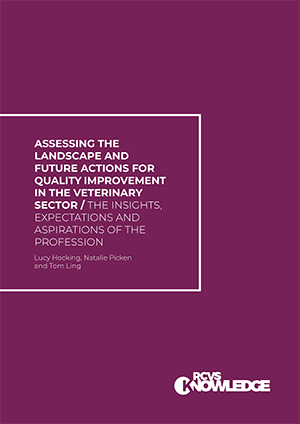QI in the veterinary professions
Though the veterinary professions have made progress in establishing some form of clinical governance, full-cycle quality improvement (QI) is not yet embedded in day-to-day work across the sector.
Our research suggests that although 96% of the professions agreed that QI improves veterinary care, a lack of time, know-how and organisational support – among other barriers – are preventing professionals from engaging with quality improvement. 60% were able to spend no more than three days on quality improvement activity in the previous year, while 11% spent no time at all on QI.
As such, there is a significant discrepancy between what veterinary teams believe they should be doing and what they are actually able to do in practice.
Embedding full-cycle quality improvement will require evolution – rather than a revolution – given that activity in these areas is already taking place in some quarters of the veterinary industry.
Key recommendations
Our research indicates commitment is needed from various stakeholders in the sector:
- Teams should unite in a reflective learning culture: they should discuss areas for improvement with openness and understanding; identify improvement initiatives; and share and anonymise data acquired through benchmarking, auditing and rapid learning cycles.
- Veterinary professionals and their teams must be afforded the time, skills and opportunities to engage with continuous quality improvement. Practices and practice groups, including charity practices, should encourage a culture of learning rather than blame; allocate protected time to employees; explore formal mentoring; and write QI into job descriptions, appraisals and interviews.
- Collaboration is needed between the major organisations, policy-makers and membership bodies on a leadership strategy driving a culture of continuous improvement across the veterinary sector.
- QI should have a much greater role in veterinary education, at both undergraduate and postgraduate level. Universities, CPD providers and other educators should make this a priority.
-
Researchers, academics and funders should focus efforts on analysing the business benefits – economic and workforce – of QI in the industry.
-
Clinical audits and other QI techniques need to be incorporated into practice-level software, such as apps and practice management systems.
-
Led by veterinary client mediation services, complaints should be systemically used to identify and prioritise areas for improvement.
-
Animal owners should be given a greater opportunity to get involved with practice-level quality improvement initiatives.
"The resounding agreement from colleagues across the professions that quality improvement enhances veterinary care confirms that the time is now to embrace the opportunities QI presents for safer, more efficient and improved outcomes for patients — aims that we know drive veterinary professionals in their work every day."
Chris Gush, Executive Director, RCVS Knowledge
The study
In early 2019, RCVS Knowledge commissioned RAND Europe to undertake research to assess the QI landscape in the veterinary sector. The purpose was to provide a wide, robust evidence base to support organisations and veterinary professionals to implement systematic continuous quality improvement in day-to-day practice.
The study’s findings and recommendations are based on views from across the breadth of the professions, gathered during 2019. A national survey, focus groups, interviews with animal caregivers and an in-depth literature review gave the research team substantial insight into the state of play of veterinary quality improvement, complemented by last May’s ‘National Summit for Supporting Quality Improvement in Veterinary Care’, which attracted more than 50 industry leaders.
“The RAND Europe team has been impressed by the commitment of the veterinary sector to embed good quality improvement practices into their work with the aim of achieving better outcomes for animals and wider public benefits.”
Tom Ling, Head of Evaluation, RAND Europe
How RCVS Knowledge supports you
Through our ever-growing suite of resources, we are committed to supporting veterinary professionals as they continue or embark on their QI journey.
- We offer free CPD and resources to get you started on your QI journey.
- Already progressing with your QI initiative? Why not share your story with us by submitting a case example.
- Join us at one of our events.
- Sign up to our newsletter to stay up to date with the latest QI news.
- Find out exactly how RCVS Knowledge is supporting quality improvement in veterinary care.
